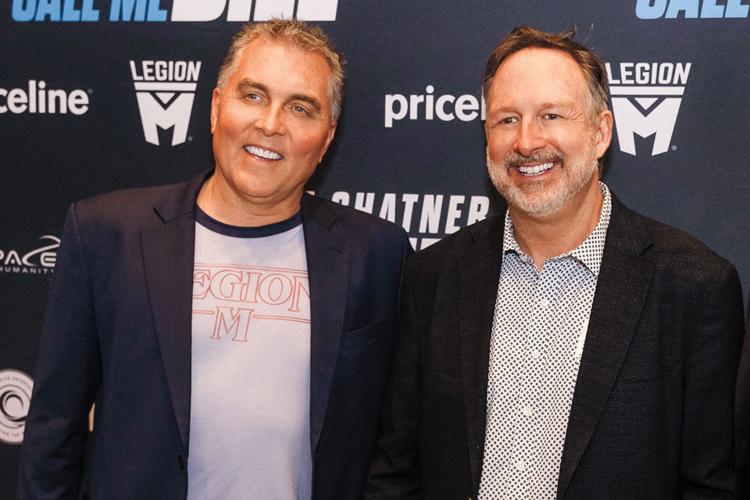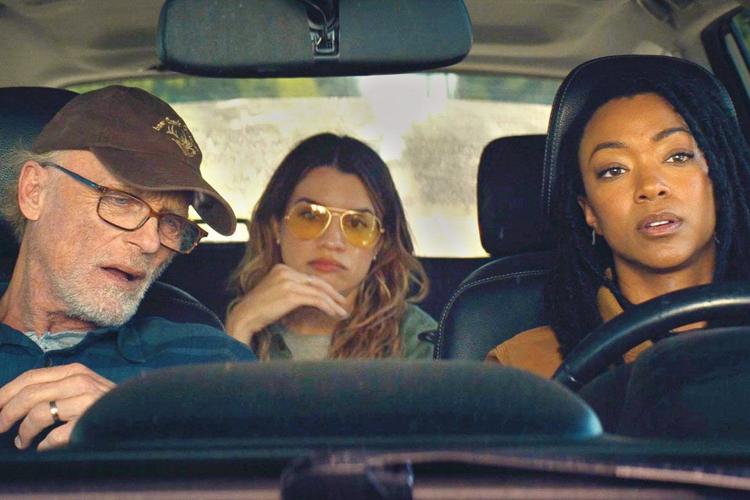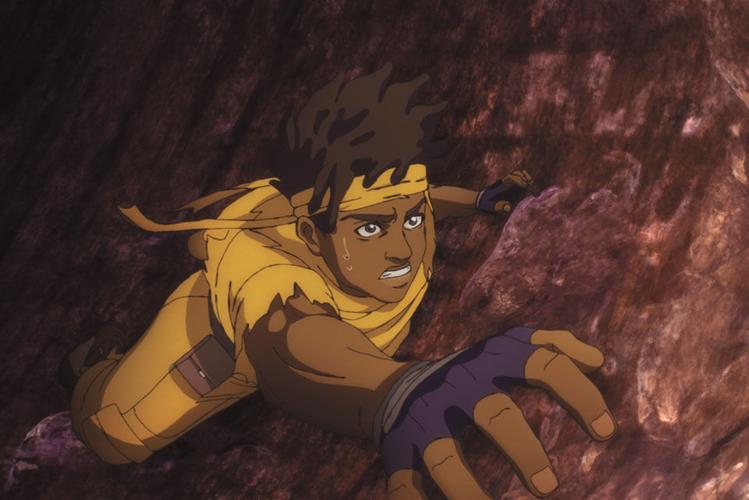
Legion M’s Paul Scanlan and Jeff Annison.
Centering Fans
Paul Scanlan and Jeff Annison set out to create a new kind of studio when they cofounded Legion M, the first entertainment company owned by fans. Now with more than 50,000 investors, some contributing as little as $40, Legion M produces innovative feature and documentary films while also giving fans a say in the projects they make.
“We felt like there’s no industry that is more suited for equity crowdfunding than film and television,” says Annison. “If you’ve got a movie studio that is owned by a large audience of people … you’ve got a built-in competitive advantage because you’ve got a legion of people that are going to come out and support your movie.”
Started in 2016, the company’s biggest critical success to date is My Dead Friend Zoe, which was released in theaters in February 2025 and is now available to stream online. The film stars Sonequa Martin-Green, Natalie Morales, Ed Harris, and Morgan Freeman and is directed and cowritten by Kyle Hausmann-Stokes. The dark comedy-drama tells the story of Merit (Martin-Green), a veteran who is grappling with reentering civilian life, her beloved veteran grandfather’s Alzheimer’s disease diagnosis, and the passing of her Army best friend.

My Dead Friend Zoe’s Ed Harris (left), Natalie Morales, and Sonequa Martin-Green (right).
Scanlan and Annison were producers on the film, originally a short based on Hausmann-Stokes’s experiences. My Dead Friend Zoe received the Audience Award at SXSW upon its full-length premiere and earned 95 percent critics and audience scores on Rotten Tomatoes. “Sometimes movies will come out, and they’ve got 10 reviews. … This one has [more than 90],” says Annison. “This is, right now, [one of the] highest-rated movies in Morgan Freeman’s entire career.”
The longtime East Bay residents—Scanlan lives in Orinda, while Annison resides in Clayton—met through a friend and later cofounded Emmy Award–winning MobiTV, a pioneer for live and on-demand streaming to mobile phones and eventually all devices. It was purchased by TiVo in 2021. After producing high-profile Legion M projects featuring bold names such as William Shatner, Sean Astin, Simon Pegg, Minnie Driver, and Christopher Lloyd, Scanlan and Annison are eagerly anticipating the release of their comedic horror movie Fade to Black, which satirizes the entertainment industry. Also under development is Defiant, about Civil War hero Robert Smalls, an enslaved man who stole a Confederate ship. The project is written by Captain America: Brave New World’s Rob Edwards.
“Our headquarters are based in Los Angeles, but Jeff and I live up here,” says Scanlan. “We don’t live and breathe the doctrine that is Hollywood. We’re not trying to do things the way everybody has done them for decades. … We’re looking at the industry as insiders with an outsider’s perspective.”

Documentary filmmaker Julian Brave NoiseCat.
Highlighting Indigenous Voices
Making the Oscar-nominated documentary Sugarcane was an intensely personal experience for Julian Brave NoiseCat. The project, which was one of the Best Documentary Feature Film contenders at the Academy Awards in March, follows investigations into allegations of physical and sexual abuse of children at a Catholic Church–run Indian residential school in Canada. NoiseCat’s father was a survivor of the school, and watching his loved ones shine at the Oscars was the culmination of the emotional journey it took to bring the story to screen.
“To see my dad and auntie Charlene and chief Willie on the red carpet representing not just our film but our people, giving us a reason to hold our heads high, has just been the treat of a lifetime,” says NoiseCat, who codirected Sugarcane with Emily Kassie. “It’s not often that you see people who dress like us out on the red carpet, and we wanted to make it look good.”
NoiseCat, a Berkeley High School alum who spent his formative years in Oakland, is an acclaimed writer, activist, and journalist, whose first book, We Survived the Night, will drop in October. A member of the Tsqéscen First Nation and descendent from Mount Currie’s Lílwat Nation, he was hesitant when Kassie, a former Huffington Post coworker and friend, first approached him regarding collaborating on a documentary about residential schools. When he eventually confirmed his interest, he was stunned to find out she’d been following a lead with the Williams Lake First Nation’s investigation into the school at St. Joseph’s Mission.

Sugarcane
“That was the school that my family was sent to and where my father was born,” he says. “Out of 139 Indian residential schools across Canada, Em had happened to focus our documentary on the one school that my family was taken away to.”
The duo spent almost three years making the film, even following chief Rick Gilbert to the Vatican as part of a delegation of Native leaders who visited Pope Francis. Sugarcane premiered at Sundance Film Festival in January 2024, where NoiseCat and Kassie earned recognition for their direction, and was later acquired by National Geographic Documentary Films. The doc can now be streamed on Disney+ and Hulu.
“While the film tells a very particular story about a very troubling history, you don’t have to be Native to understand family trauma and family secrets,” says NoiseCat. “I was terrified to put such a personal and painful story out there. I am just so grateful that my family, my community in Indian country more broadly, and audiences around the world have loved the film.”

Writer and director LeAndre Thomas.
Building Up the Bay
The TV series Star Wars: Visions, streaming now on Disney+, offers viewers short animated films capturing a variety of cultural influences but set in a galaxy far, far away. The show’s second season includes a short called “The Pit,” featuring a story focused on a young boy voiced by Oakland’s Daveed Diggs. He is one of a group of prisoners left to die in a large desert pit by the Empire before he escapes to seek help in a nearby city.
The episode’s codirector, writer, and executive producer, LeAndre Thomas, has a love of Star Wars and the visual arts that dates back to his childhood in Oakland.
“I started drawing and doodling my own comic books at a very young age. That led to telling stories through photography,” says Thomas. “Filmmaking is the sibling of photography. I would use my mom’s camcorder and run around the East Bay making my own little short films.”
After graduating from Academy of Art University in San Francisco, Thomas joined Lucasfilm almost 14 years ago, where he is currently a franchise video assets manager. “Lucasfilm, in Northern California, is our movie castle,” he says. “It was the ideal place for me. I could stay home and work on a brand that I feel so passionate about and grew up loving so much.”

Star Wars: Visions
In both format and content, Star Wars: Visions is a one-of-a-kind addition to the iconic sci-fi franchise. “The cool thing about Star Wars is it’s a huge sandbox,” says Thomas, who penned the script for “The Pit” in 2020 around the George Floyd protests. “I wanted to tell a Star Wars story that spoke to some of the backgrounds of people like me, especially growing up in Oakland and in the East Bay, using the themes that we preach in Star Wars of rebellion, empires, and oppression.”
Beyond Lucasfilm, Thomas won an award at the Pasadena International Film Festival for his direction of short film Mirror in 2019, and he recently teamed up with the Bay List, a new initiative from Rafael Casal and Franklin Leonard that attempts to elevate projects from local cinematic storytellers. He is also developing a live-action feature film, which will be set in San Francisco.
“I feel like the Bay Area doesn’t get enough credit for being a regional institution for cinema. We’re close to Hollywood, but we’re not at the same time, and that gives us a little bit of a uniqueness,” says Thomas. “We have a creativity and an independence that is so important and vibrant to the industry.”

















